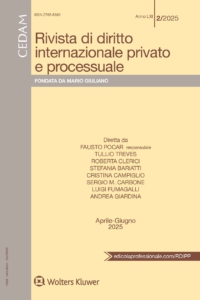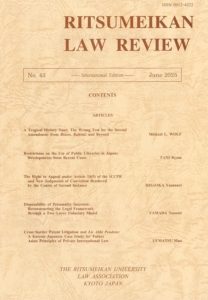Views
The Moroccan Supreme Court on the Authenticity of an Apostillised Certificate of Conversion to Islam
I. Introduction
As mentioned in a previous post, Morocco is not only the MENA Arab jurisdiction that has ratified the largest number of the HCCH Conventions (7 in total), but also a country where the HCCH conventions have been actively applied (see here on the application of the HCCH 1980 Child Abduction Convention, and here for a case involving the application of the HCCH 1996 Child Protection Convention). The application of the HCCH Conventions in Morocco offers valuable insights into how these HCCH instruments operate within an Islamic context, challenging the widely held assumption of the existence of an Islamic exceptionalism (though such exceptionalism does exist, but to a varying degree across the Muslim-majority countries. See e.g. Béligh Elbalti, “The Recognition and Enforcement of Foreign Filiation Judgments in Arab Countries” in Nadjma Yassari et al. (ed.), Filiation and the Protection of Parentless Children (T.M.C. Asser Press, 2019), 373-402).
An anti-suit injunction in support of an arbitration agreement in light of the EU Sanction against Russia
By Poomintr Sooksripaisarnkit, Lecturer in Maritime Law, Australian Maritime College, College of Sciences and Engineering, University of Tasmania
On 24th September 2024, Mimmie Chan J handed down the judgment of the Court of First Instance of the High Court of the Hong Kong Special Administrative Region in Bank A v Bank B [2024] HKCFI 2529. In this case, the Plaintiff (Bank A) with its base of operation in Germany was under the supervision of the German Federal Financial Supervisory Authority (BaFin). Its majority shareholder was the Defendant (Bank B) who held 99.39% shares. In turn, the Defendant was a Russian bank whose majority shareholder was the Government of the Russian Federation.
Compensation, y nada más – CJEU decides against Real Madrid in Case C-633/22
Just two days after losing to LOSC Lille in the Champions League, Real Madrid suffered another defeat against a French opponent. Among the 44 (!) judgments published this Friday by the CJEU – a flurry of decisions reminiscent of the madness that is the current Champions League format –, the Court decided a true ‘clásico’ of European private international law in Case C-633/22 Real Madrid Club de Fútbol.
News
Rivista di diritto internazionale privato e processuale (RDIPP) No 2/2025: Abstracts
 With a slight delay – entirely due to myself – I am pleased to announce the release of the second 2025 issue of the Rivista di diritto internazionale privato e processuale (RDIPP, published by CEDAM). This issue features:
With a slight delay – entirely due to myself – I am pleased to announce the release of the second 2025 issue of the Rivista di diritto internazionale privato e processuale (RDIPP, published by CEDAM). This issue features:
Francesco Pesce, Associate Professor at the University of Genoa, Il riconoscimento delle decisioni straniere in materia civile tra previsioni sulla competenza funzionale del giudice interno e comunicazioni alla Commissione europea (Recognition of Foreign Decisions in Civil Matters between Provisions on the Functional Jurisdiction of National Courts and Communications to the European Commission; in Italian) Read more
Virtual Workshop (in English) on September 2, 2025: Eva Lein on “PIL and dispute resolution in times of crisis”

On Tuesday, September 2, 2025, the Hamburg Max Planck Institute will host its monthly virtual workshop Current Research in Private International Law at 11:00 a.m. – 12:30 p.m. (CEST). Professor Eva Lein (Lausanne University) will speak, in English, about the topic
“PIL and dispute resolution in times of crisis”
In times of polycrisis, the law is put to the challenge. In international commercial transactions the question is how law can safeguard commercial activity, avoid a plethora of disputes, and encourage a pragmatic legal environment conducive to global economic recovery. This contribution discusses how dispute settlement mechanisms and private international law can be used to responsibly manage disputes in this context and to appropriately respond to future crises.
The presentation will be followed by open discussion. All are welcome. More information and sign-up here.
If you want to be invited to these events in the future, please write to veranstaltungen@mpipriv.de.
UEMATSU on Cross-border Patent Litigation and Lis Alibi Pendens: A Korean–Japanese Case Study for Future Asian Principles of Private International Law

The latest issue of the Ritsumeikan Law Review (No. 43, 2025), a law review in English published by the Ritsumeikan University Law Association since 1986, features a study by Professor Mao UEMATSU (School of Law, Ritsumeikan University) entitled Cross-border Patent Litigation and Lis Alibi Pendens: A Korean–Japanese Case Study for Future Asian Principles of Private International Law.
The article examines a series of patent litigation cases in Korea and Japan, analyzing them to “illustrate the complexity of cross-border patent litigation.” It further argues that, even after reforms to procedural laws in both Korea and Japan, structurally similar cross-border conflicts remain unresolved. The paper concludes with preliminary reflections on possible improvements in legal coordination within Asia.
By introducing case law from both jurisdictions and sharing information on recent legal developments in the region, the study provides valuable material for comparative research and contributes to a better understanding of the dynamics of Asian private international law.
The paper is freely available at the Ritsumeikan Law Review online version here.


